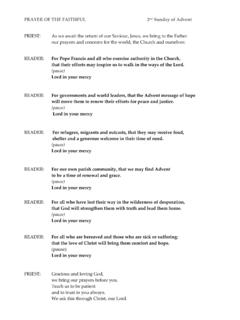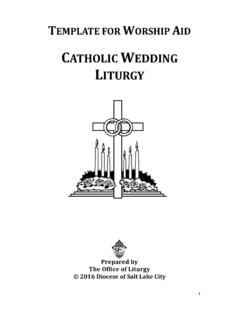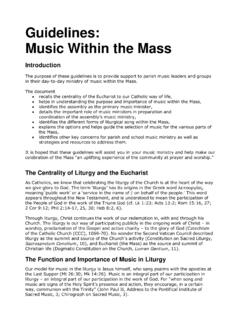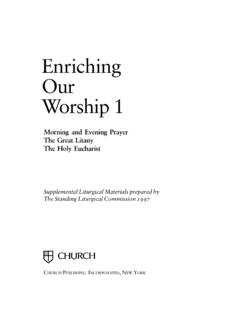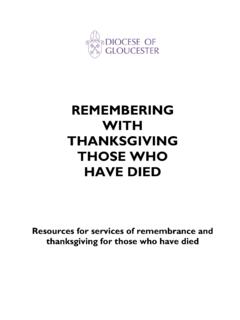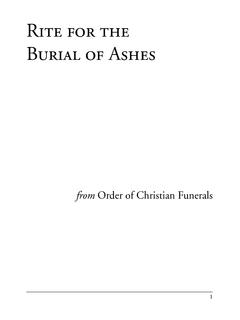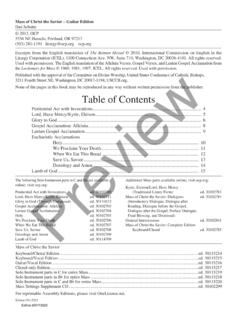Transcription of A Body of Divinity
1 A body of DivinitybyThomas WatsonTable of Contentsp. iiAbout This Book..p. 1A body of Divinity ..p. 2 Contents ..p. 4 Brief Memoir Of Thomas Watson ..p. 91. A Preliminary Discourse To Catechising ..p. 132. Introduction ..p. 131. Man s Chief End ..p. 262. The Scriptures ..p. 353. God and his creation ..p. 351. The Being Of God ..p. 452. The Knowledge Of God ..p. 493. The Eternity Of God ..p. 534. The Unchangeableness Of God ..p. 575. The Wisdom Of God ..p. 616. The Power Of God ..p. 647. The Holiness Of God ..p. 688. The Justice Of God ..p. 729. The Mercy Of God ..p. 7610. The Truth Of God ..p. 7911. The Unity Of God ..p. 8212. The Trinity ..p. 8513. The Creation ..p. 8914. The Providence Of God ..p. 964. The fall ..p. 961. The Covenant Of Works ..p. 1022. Adam s Sin ..p. 1053. Original Sin ..p. 1104. Man's Misery By The Fall ..p. 1145. The covenant of grace and its mediator.
2 P. 1141. The Covenant Of Grace ..p. 1192. Christ The Mediator Of The Covenant ..p. 1223. Christ's Prophetic Office ..p. 1264. Christ's Priestly Office ..p. 1365. Christ's Kingly Office ..p. 1406. Christ s Humiliation In His Incarnation ..iiiThomas WatsonA body of Divinityp. 1487. Christ s Exaltation ..p. 1528. Christ The Redeemer ..p. 1566. The application of redemption ..p. 1561. Faith ..p. 1592. Effectual Calling ..p. 1633. Justification ..p. 1674. Adoption ..p. 1735. Sanctification ..p. 1806. Assurance ..p. 1877. Peace ..p. 1928. Joy ..p. 1969. Growth In Grace ..p. 20010. Perseverance ..p. 2087. Death and the last day ..p. 2081. The Death Of The Righteous ..p. 2112. A Believer s Privilege At Death ..p. 2183. The Resurrection ..p. 227 Indexes..p. 227 Index of Scripture References..ivThomas WatsonA body of DivinityA body of DivinityContained In Sermons Upon The Westminster Assembly s CatechismBy Thomas WatsonThomas WatsonA body of DivinityContents 1.
3 Brief Memoir Of Thomas Watson 2. A Preliminary Discourse To Catechising 3. Introduction Man s Chief End The Scriptures 4. God and his creation The Being Of God The Knowledge Of God The Eternity Of God The Unchangeableness Of God The Wisdom Of God The Power Of God The Holiness Of God The Justice Of God The Mercy Of God The Truth Of God The Unity Of God The Trinity The Creation The Providence Of God 5. The fall The Covenant Of Works Adam s Sin Original Sin Man s Misery By The Fall 6. The covenant of grace and its mediator The Covenant Of Grace Christ The Mediator Of The Covenant Christ s Prophetic Office Christ s Priestly Office Christ s Kingly Office Christ s Humiliation In His Incarnation Christ s Exaltation Christ The Redeemer 7. The application of redemption Faith Effectual Calling Justification Adoption Sanctification2 Thomas WatsonA body of Divinity Assurance Peace Joy Growth In Grace Perseverance 8.
4 Death and the last day The Death Of The Righteous A Believer s Privilege At Death The Resurrection3 Thomas WatsonA body of DivinityBrief Memoir Of Thomas WatsonCompiled by C. H. SpurgeonThomas Watson s body of Practical Divinity is one of the most precious of the peerless worksof the Puritans; and those best acquainted with it prize it most. Watson was one of the most concise,racy, illustrative, and suggestive of those eminent divines who made the Puritan age the Augustanperiod of evangelical literature. There is a happy union of sound doctrine, heart-searching experienceand practical wisdom throughout all his works, and his body of Divinity is, beyond all the rest,useful to the student and the minister. Although Thomas Watson issued several most valuablebooks, comparatively little is known of him - even the dates of his birth and death are writings are his best memorial; perhaps he needed no other, and therefore providence forbadethe superfluity.
5 We shall not attempt to discover his pedigree, and, after the manner of antiquarians,derive his family from a certain famous Wat, whose son distinguished himself in the Crusades, orin some other insane enterprise; whether blue blood was in his veins or no is of small consequence,since we know that he was the seed-royal of the redeemed of the Lord. Some men are their ownancestors, and, for ought we know, Thomas Watson s genealogy reflected no fame upon him, butderived all its lustre from his achievements. He had the happiness to be educated at EmmanuelCollege, Cambridge, which in those days deserved to be called the School of Saints, the nursingmother of gigantic evangelical divines. In Kennet s Register and Chronicle, is a list of eighty-sevennames of Puritan ministers, including many well-known and loved as preachers and commentators;such as Anth. Burgess, W. Jenkyn, Ralph Venning, Thomas Brooks, T.
6 White, Samuel Slater,Thomas Watson, John Rowe, Dr. W. Bates, Stephen Charnock, Samuel Clarke, Nathaniel Vincent,Dr John Collings, William Bridge, Samuel Hildersam, Adoniram Bifield, followed by this remark, These are most of them mentioned in the list of sufferers for Nonconformity, and appear upon theregisters to have been all of Emmanuel College, beside great numbers, no doubt of the same society,who were forward preachers up of the unhappy changes of 1641, etc. In the margin of the book isthe following observation on the foregoing: It may not be improper to observe how much youngstudents, in both Universities, fell in with the prejudices of their governors and tutors. This was thereason that this single College of Emmanuel, in Cambridge, bred more of the Puritans andNonconformists than perhaps any seven of the other Colleges or Halls in either University. Sucha fact as this should attract the prayers of all believers to our seminaries for the sons of the prophets,since upon the manner in which these institutions are conducted will depend under God the futurewell-being of our churches.
7 The Pastors, College, for the use of whose students this work ispublished, earnestly petitions for a place in the intercessions of the are not at all surprised to learn that Thomas Watson enjoyed the repute, while at Cambridge,of being a most laborious student; the great Puritanic authors must have been most industriousworkers at the university, or they never would have become such pre-eminent masters in conscientious student is the most likely man to become a successful preacher. After completinghis course with honour, Watson became rector of St Stephen s, Walbrook, where in the very heartof London he executed for nearly sixteen years the office of a faithful pastor with great diligenceand assiduity. Happy were the citizens who regularly attended so instructive and spiritual a church was constantly filled, for the fame and popularity of the preacher were deservedly in and out among his flock, fired with holy zeal for their eternal welfare, his years rolled on4 Thomas WatsonA body of Divinitypleasantly enough amid the growing respect of all who knew him.
8 Calamy, in his NonconformistMemorial, says of him: - He was so well known in the city for his piety and usefulness, that thoughhe was singled out by the Friendly Debate, he yet carried a general respect from all sober personsalong with him to his grave. He was a man of considerable reaming, a popular, but judicious preacher(if one may judge from his writings), and eminent in the gift of prayer. Of this, the followinganecdote is a sufficient proof. Once on a lecture day, before the Bartholomew Act took place, thelearned Bishop Richardson came to hear him at St Stephen s, who was much pleased with hissermon, but especially with his prayer after it, so that he followed him home to give him thanks,and earnestly desired a copy of his prayer. Alas! (said Mr Watson) that is what I cannot give,for I do not use to pen my prayers; it was no studied thing, but uttered, pro re nata, as God enabledme, from the abundance of my heart and affections.
9 Upon which the good Bishop went awaywondering that any man could pray in that manner the hand which of old had oppressed the church was again stretched forth to vex certain ofthe saints. The most learned, holy, and zealous of the clergy of the Church of England found thatthe Act of Uniformity would not allow them to preserve a clean conscience and retain their livings,and therefore they submitted to the loss of all things for Christ s sake. Thomas Watson did nothesitate as to the course he should pursue. He was not a factious hater of royalty, a red republican,or fifth monarchy-man; in fact, he had in Cromwell s day been all too loyal to the house of Stuart;he had protested against the execution of the King, and had joined in Love s plot for the bringingin of Charles II; yet all this availed nothing, he was a Puritan, and therefore must not be toleratedby the bitter spirits then dominant in the Establishment.
10 What seeds of discord were sown on thatblack Bartholomew history has not had space to record; yet the ultimate results have been fraughtwith results scarcely then imaginable. Comprehension might have hindered truth; the crown rightsof King Jesus might have lacked advocates had monarchs and priests been more tolerant; as it wasgood men were forced into a truer position than they would otherwise have occupied, and thebeginning of a real reformation was inaugurated. From that commencement in suffering whatprogress has been made! Every day the cause of the ejected gathers force and pushes on its adversarytowards the brink of the precipice, a down which all establishments must many tears and lamentations the congregation of St Stephen s saw their shepherd aboutto be removed from his flock, and with aching hearts they listened to his parting words. He himselfspeaking as one bereaved of his dearest delight, and yet suffering joyfully the loss of all things,bade them adieu, and went forth not knowing whither he went.


